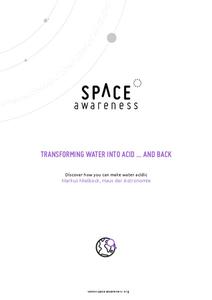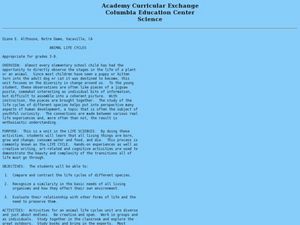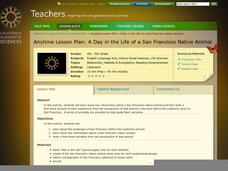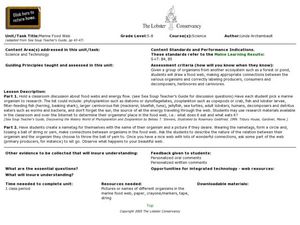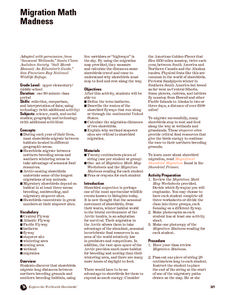Space Awareness
Transforming Water Into Acid ... And Back
Greenhouse gases affect marine wildlife in life-threatening ways. Through experimentation, your classes explore the acidification of water from the main greenhouse gas carbon dioxide. As they introduce carbon dioxide to water, a pH...
American Physiological Society
What Environmental Conditions Lead to the Hatching of Brine Shrimp?
Will changing the environment in which brine shrimp live impact their reproductive success? Young scientists get hands-on experience studying the habitat of brine shrimp in a two-week immersion lesson. The teacher's guide provides all of...
Curated OER
Vocabulary: Life Science: Animal Life Cycles
Pupils read and discuss vocabulary words about animal life cycles. In this animal life cycles lesson plan, students use the bulletin board for repeated use in referring to their vocabulary words.
Curated OER
Animal Life Cycle
Students conduct hands-on experiments. In this life cycle activity, students are able to observe a variety of animals as they travel through their life cycle (brine shrimp, mealworms, frog eggs and chicken eggs). Students respond to...
Curated OER
Marine Debris
Now is the time to educate tomorrow's citizens to care for the planet, and here is a lesson to help facilitate the process. Collect some marine debris and bring it into class. Have your class separate it into types and then test each...
California Academy of Science
Composting: A Scientific Investigation: California Academy of Sciences
Garbage, recycle, compost: Does it really matter where we put our trash once we are done? By making detailed observations over seven weeks, kids will see which materials break down naturally to become a healthy part of the soil, and...
California Academy of Science
A Day inthe Life of a San Francisco Native Animal
Although the lesson is specifically about the San Francisco Bay area, it's good enough to be adapted to any local region. Children research what the landscape in San Francisco was like prior to settlement, they consider the types of...
Curated OER
Effects of Oil Spills on Environment and Marine Life
Students explore oceanography by conducting an environmental experiment in class. In this oil spill lesson, students discuss the human need for oil and what is at stake when we drill for oil in our oceans. Students read a book in class...
Curated OER
Sustainable Marine Fisheries
Through a fishing simulation, environmentalists discover consequences of over fishing. Afterward, they discuss how the activity relates to the impact of real-life commercial fishing. They also consider sustainability in the fishing...
Curated OER
The Long Road to Coffee
Students discover how coffee is processed from a plant, to a drink. For this life cycle lesson, students study that cells and organisms go through a cycle of growth and change. Students organize picture cards, illustrate how coffee is...
American Forest Foundation
Who Speaks for the Trees?
Help young conservationists appreciate the important role that trees play in ecosystems around the world with this collection of six engaging activities. From a shared reading and class discussion of Dr. Seuss' The Lorax, to in an depth...
Oklahoma State University
Hairy Heredity
Young scholars learn that heredity comes down to the flip of a coin with this cross-curricular math and science lesson. Using smiley faces as a model, young scholars toss coins to determine which dominant or recessive traits will be...
Curated OER
Life Processes
Students identify life processes and create their own creature. In this creative science lesson, students identify an organism's life processes and categorize them into groups. They then create their own creature and write about how it...
Curated OER
Life Cycle of Hawaii's Honu
Students simulate the life cycle of Hawaii's Honu. In this Science lesson, students act out the life cycle of the Hawaiian sea turtle. Students determine and play the roles of prey and predator.
Curated OER
What Does Life Look Like Under a Microscope?
Young scholars discover cells make up all living things. In this life science instructional activity, students investigate living organisms and the cells that create them. Finally the young scholars create a testable question, conduct an...
Curated OER
Marine Debris
Pupils perform experiments to examine if debris float, or blow in the wind. The effects of these characteristics on the marine debris are then discussed. They determine how a material can influence what becomes marine debris.
Curated OER
Animal Life Cycles
Students participate in numerous activities to gather information about parts of the life cycle. For this life science lesson, the teacher choose from a number of activities to create or support an interdisciplinary unit about the life...
Curated OER
Life Science 2c- From Parents to Young -Traits Bulletin Board
Students recognize what traits are inherited. In this inherited traits bulletin board lesson plan, students complete a chart showing what traits they have inherited and from whom.
Curated OER
Marine Food Web
Students investigate the effects of the food chain on all animals by creating a food web. In this seafood lesson, students discuss energy flow and research a specific marine organism of their choice. Students create a food web in their...
NOAA
Sustaining Our Ocean Resources
Lead young scientists on an investigation of fishery practices with the final installment of this four-part unit. Using a PowerPoint presentation and hands-on simulation, this activity engages children in learning how fish populations...
NOAA
Seafood and Human Health
Whether your young biologists realize it or not, humans play a significant role in marine ecosystems. To help them understand this fact children first create graphical representations that show homo sapiens' place in marine food chains,...
Curated OER
Classifying Deep-Sea Organisms
Young scientists access the EARTH Web site in order to engage in this lesson life forms found in the ocean. Student groups of 3 - 4 choose one set of deep-sea organism images. The groups decide how they would classify their organisms and...
Baylor College
Lungometer
Life science learners construct lung-o-meters from gallon-sized milk jugs and then measure their lung capacities. For older students, have them graph the vital lung capacities of each person in the class. Cross-curricular pieces are...
Prince William Network
Migration Math Madness
A great way to incorporate math into life science, this lesson has learners measure migratory routes on a map and calculate the actual distance that shorebirds on the routes would cover. Learners compute the distance covered in both...


